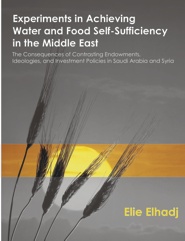LibrarySocial SciencesEconomics
Experiments in Achieving Water and Food Self-Sufficiency in the Middle East
The Consequences of Contrasting Endowments, Ideologies, and Investment Policies in Saudi Arabia and Syria
| Institution: | London University |
|---|---|
| Advisor(s): | Professor Tony Allan |
| Degree: | Ph.D. |
| Year: | 2005 |
| Volume: | 210 pages |
| ISBN-10: | 1581122985 |
| ISBN-13: | 9781581122985 |
Abstract
The book aims to quantify and analyze how two water scarce but ideologically different Middle Eastern political economies, Saudi Arabia and Syria, addressed water sector investment between 1980 and 2000. The study examines how narrow-coalitions of decision-makers obsessed by impossible-to-achieve food self-sufficiency goals, lacking environmental consideration and safe political processes contributed to massively waste scarce resources and unsustainable water policies.
The book shows that of Saudi Arabia’s US$1,034 billion in oil revenues (1974-2001), 48% was spent on security, plus 10% on the ruling family. Nominal Per capita income dropped by 42% (1981-2000). Syria’s per capita income dropped (1985-2000) by 17%, to US$1,200. Armaments’ consumed (1970-1990) 13% of GDP.
Agricultural investment was wasteful. Saudis produced wheat at five times the international price, depleted 300 billion m3 of mainly non-renewable groundwater and degraded aquifers’ quality. 53% of Saudis have no municipal water connections. Syria’s Government return on agricultural investment in 2000 was estimated at US$150 million loss. Aquifers’ quality was degraded, leaving most urban households enduring acute water shortages.
About The Author
Elhadj is a banker with 30 years of banking experience in New York, Philadelphia, London and Riyadh, Saudi Arabia. For most of the 1990's, Elhadj was chief executive officer of a major Saudi bank. At age 54, he joined London University's School of Oriental and African Studies to attain his Master's Degree and Ph.D. His doctoral dissertation addressed issues of food self-sufficiency and water politics in the Middle East. His book The Islamic Shield was published by BrownWalker Press in 2006.

